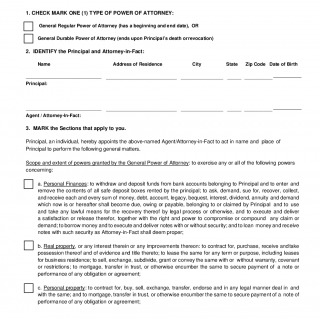General Power of Attorney
A General Power of Attorney is a legal document that gives one person (the agent or attorney-in-fact) the power to act on behalf of another person (the principal) in a variety of legal and financial matters. This form typically comprises several sections, including:
1. Identification of the parties: The General Power of Attorney will typically begin by identifying the parties involved, including the principal, the agent, and any witnesses who may be required to sign the document.
2. Powers granted to the agent: This section will describe in detail the powers that the principal is granting to the agent. These powers can include managing financial accounts, buying or selling property, making investments, and more.
3. Limitations on the agent's powers: This section will outline any limitations or restrictions on the agent's powers, such as restrictions on specific types of transactions, or limitations on the duration of the power of attorney.
4. Termination provisions: The General Power of Attorney will typically include provisions outlining when and how the power of attorney can be revoked, as well as any conditions under which it will automatically terminate.
A General Power of Attorney can be drawn up for a variety of reasons, such as when the principal is unable to handle their own legal or financial affairs due to illness, injury, or being absent from the country. The parties involved in this form are the principal and the agent.
When compiling this form, it is important to consider the authority you are giving to the agent and the limitations that will be placed on that authority. Specific language and details should be included in order to ensure that the document accurately reflects the wishes of the principal. It is also crucial to work with an attorney or experienced legal professional to help ensure that the document is created properly and meets all legal requirements.
There are many advantages to using a General Power of Attorney. It can provide peace of mind to the principal, knowing that their affairs are being handled by someone they trust, even if they are unable to do so themselves. It can also make it easier and more efficient to manage financial or legal matters. However, there can be problems if the form is filled out incorrectly, such as granting too much authority to the agent or failing to include necessary details or language. It is important to thoroughly understand the content of the General Power of Attorney before signing it, and to work with a qualified legal professional in order to ensure that the document is accurate and legally valid.

